Key takeaways:
- Keynote speakers significantly influence conference success by engaging audiences and inspiring motivation through personal connections and storytelling.
- Evaluating speakers involves assessing their relevant experience, audience compatibility, and gathering feedback from past events to ensure effective engagement.
- Researching speaker topics is crucial for alignment with conference themes, while understanding audience expectations enhances overall event impact.
- Finalizing a speaker choice requires balancing selection criteria, audience preferences, and logistical considerations to create an engaging conference experience.
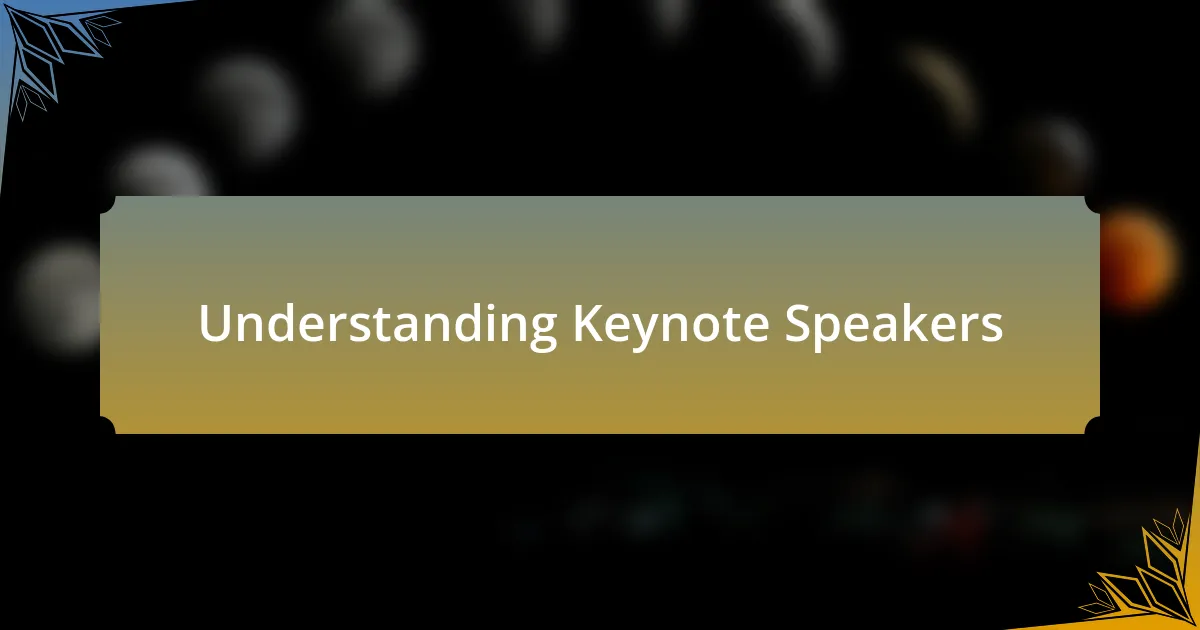
Understanding Keynote Speakers
Keynote speakers play a pivotal role in setting the tone and direction of a conference. Their ability to engage an audience can often make or break the event’s success. I’ve personally experienced moments where a speaker’s passion ignited the room, creating an atmosphere buzzing with enthusiasm and connection.
When selecting a keynote speaker, it’s crucial to consider their expertise and how it aligns with your conference’s theme. I remember attending a session where the speaker’s background in customer experience transformed a traditional topic into a riveting discussion, sparking numerous follow-up conversations among attendees. Isn’t it fascinating how the right speaker can turn information into inspiration?
Moreover, the impact of a keynote speaker extends beyond their words; it’s about the emotional journey they take the audience on. I’ve found that the best speakers don’t just inform; they connect with their audience on a personal level, sharing stories that resonate with our own experiences. Wouldn’t you agree that a speaker who shares their vulnerabilities creates a deeper bond?
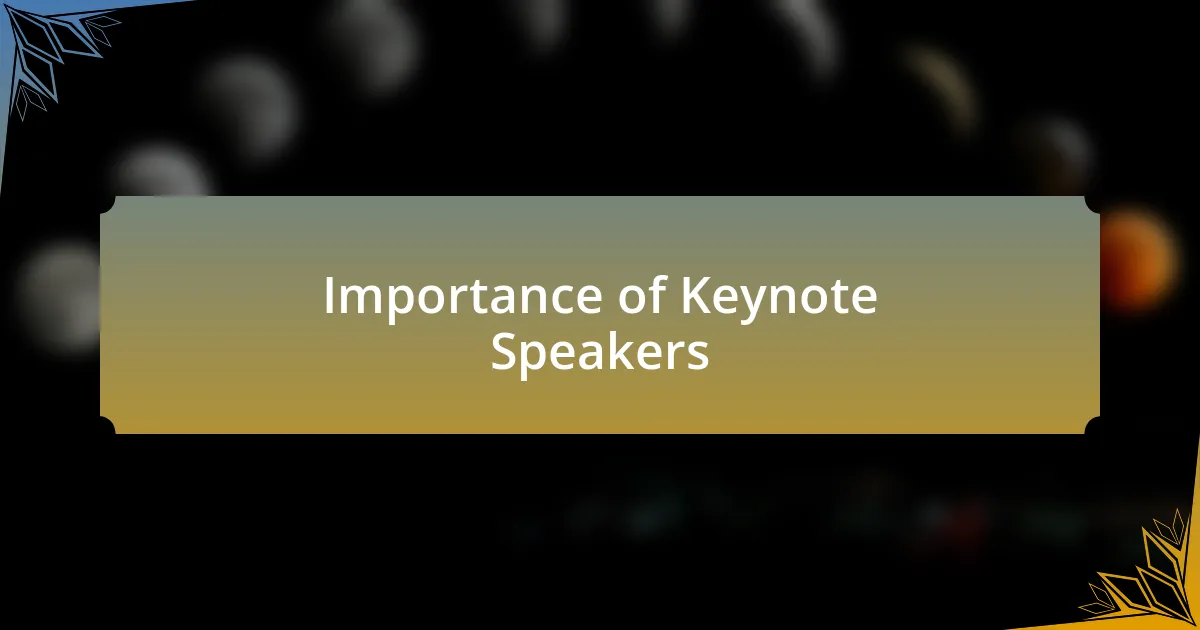
Importance of Keynote Speakers
Keynote speakers are essential because they have the power to inspire and motivate an audience, setting the stage for an impactful conference. I still remember a particular session where the speaker’s energy was contagious, transforming a room full of skeptics into eager participants. How is it that one person can so effectively change the atmosphere? It’s about their ability to connect.
Furthermore, a well-chosen keynote speaker can provide invaluable insights that align with the interests and challenges of the audience. I once attended a conference where the speaker shared innovative strategies tailored to today’s customer experience landscape. This approach not only informed but also equipped us with actionable takeaways. Have you ever left a session feeling like you just gained a roadmap for success?
Lastly, the significance of keynote speakers lies in their role as thought leaders, helping to shape the conversations that matter in their fields. Their stories can challenge our perspectives and encourage us to think differently. I recall a talk that pushed the boundaries of conventional thinking, leaving me with lingering questions that inspired my professional growth. Isn’t it remarkable how one speaker can spark a movement of ideas that lasts long after the conference concludes?
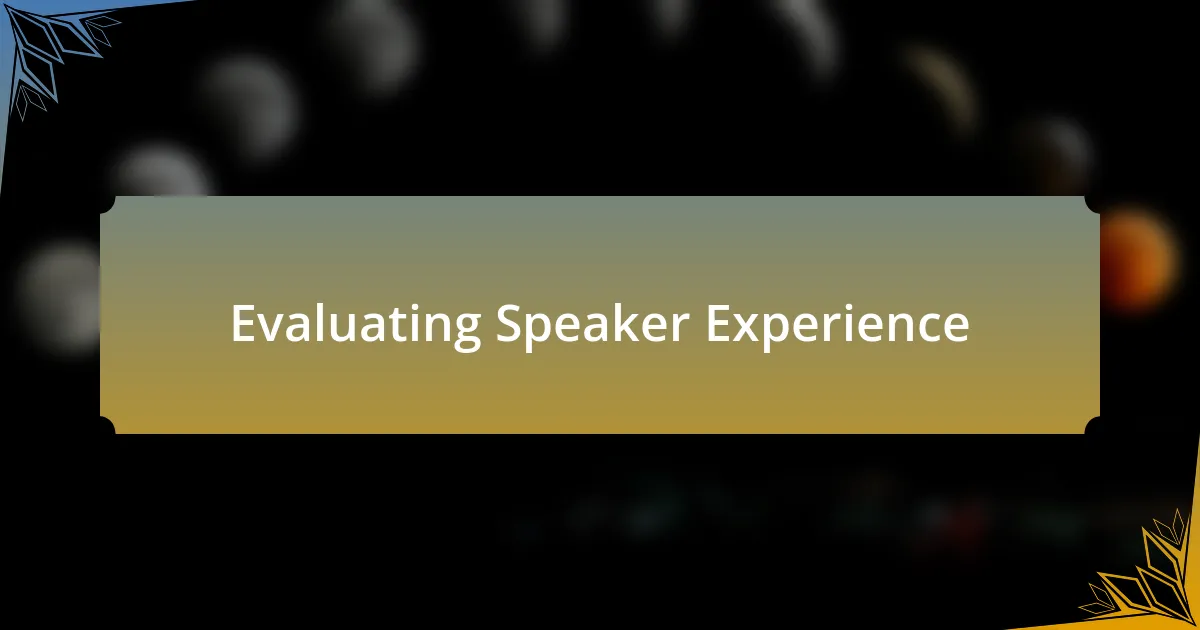
Evaluating Speaker Experience
Evaluating a speaker’s experience involves looking beyond their resume to understand their real-world expertise. I often consider their previous speaking engagements and the types of audiences they’ve captivated. For example, I once encountered a speaker who had a rich history in customer service but struggled to connect with a tech-focused crowd. It was a reminder that relevant experience goes hand-in-hand with audience compatibility.
I also think about the speaker’s ability to engage and motivate, which often comes from their years in the industry. I fondly recall listening to a speaker who had over two decades of experience in customer experience management. Their stories were not just informative; they were filled with passion and authenticity, making the session resonate deeply with attendees. Have you ever felt that connection where the speaker’s lived experiences felt like a conversation you were part of?
Lastly, I always check the references or testimonials from past events. I remember seeking feedback on a speaker I was considering for a conference and found glowing endorsements from those who had experienced their presentations. It reassured me that the excitement I felt was shared by many others. This kind of validation can really influence the decision-making process, don’t you think?

Researching Speaker Topics
Researching speaker topics is crucial for ensuring that the message aligns with the conference theme. I often start by diving into the recent trends and issues in customer experience, seeking speakers who can address relevant challenges. For instance, I once stumbled across a speaker who was tackling the impact of AI on customer interactions, and it instantly clicked with the audience’s interests. Isn’t it exciting when the topic sparks immediate engagement?
I like to explore a speaker’s content online by checking their previous presentations or articles. This process not only gives me a taste of their style but also reveals how passionate they are about their subject matter. I remember finding a speaker whose deep dives into consumer behavior left me feeling inspired and eager to learn more. Have you ever discovered a speaker whose passion made you rethink your approach to customer experience?
Additionally, I seek feedback from my network about potential topics. Engaging conversations with peers often lead to insights I might not have considered. Recently, while discussing potential speakers, my colleague pointed out a rising expert on customer journey mapping, which opened my eyes to a whole new dimension of our theme. Don’t you find that collaborative input often brings fresh perspectives that enrich our selections?
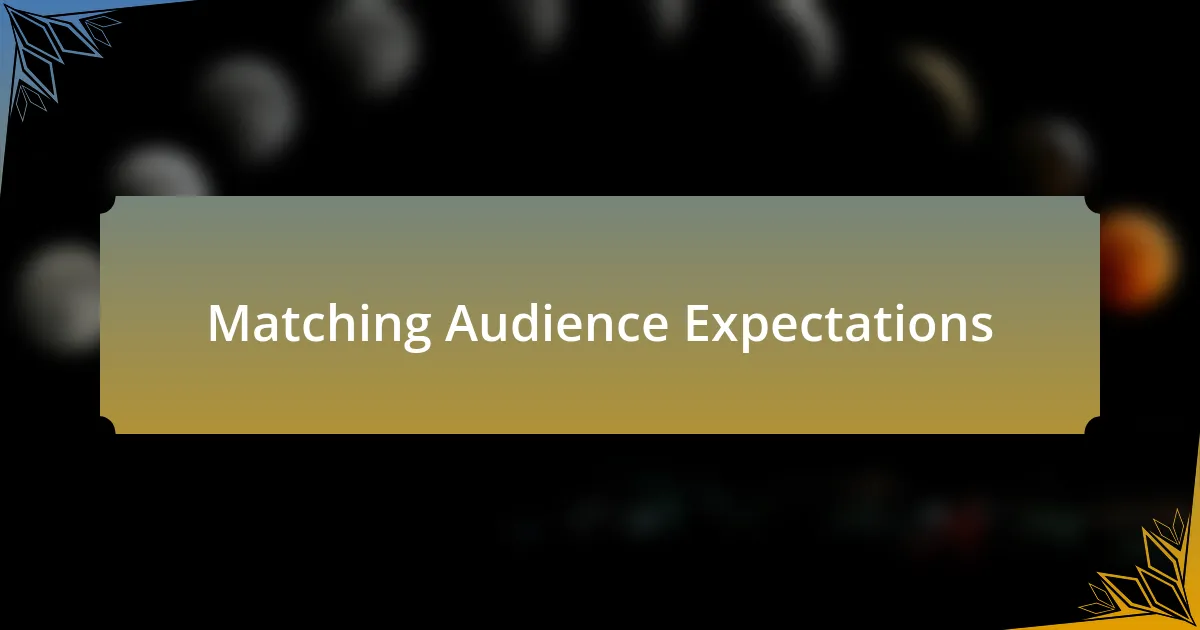
Matching Audience Expectations
When it comes to matching audience expectations, understanding their needs and interests is key. I recall a time when I thoughtfully considered the demographics of our attendees before settling on a speaker. It turned out to be immensely valuable, as the speaker’s approach to interactive technology resonated perfectly with an audience eager to enhance their customer engagement strategies.
Listening to past audience feedback has taught me the importance of delivering relevant content. I remember a particularly insightful survey we conducted after a previous conference. The responses revealed a desire for practical, actionable strategies over high-level theories. This experience reinforced my belief that when the speaker delivers on the audience’s expectations, the room comes alive with enthusiasm and engagement. Have you ever felt the energy shift in a room when the speaker hits the mark?
Lastly, I make it a point to observe how speakers tailor their messages to different audiences. A memorable moment was during a panel discussion when a speaker deftly adjusted their presentation based on audience reactions. This adaptability not only captured everyone’s attention but also showcased a deep understanding of what the audience craved. It’s fascinating how a skilled speaker can read the room, don’t you think?

Setting Selection Criteria
When setting selection criteria for a keynote speaker, I always start by identifying the specific objectives for the conference. For instance, at a recent conference I organized, we aimed to inspire innovation in customer service. By clarifying this goal from the start, I was able to focus my search on speakers who not only had expertise in customer experience but also a proven track record of igniting creative thinking in their presentations.
Beyond objectives, I consider the speaker’s relatability and communication style. I’ve experienced firsthand the difference a relatable speaker can make. During a past event, we invited a speaker who shared personal stories of overcoming challenges in the customer service field. It truly struck a chord with the audience, fostering a sense of connection that I believe was instrumental in enhancing their overall experience. Who doesn’t appreciate a speaker who feels like one of us?
Finally, I assess the speaker’s engagement with current industry trends. I recall a time when I overlooked this criterion and ended up with a speaker whose material felt outdated. The audience’s disinterest was palpable, and it wasn’t long before I realized the importance of having someone who’s not just knowledgeable but also passionate about present-day issues. Does your potential speaker reflect today’s challenges? This question guides me in ensuring that the content remains relevant and thought-provoking.
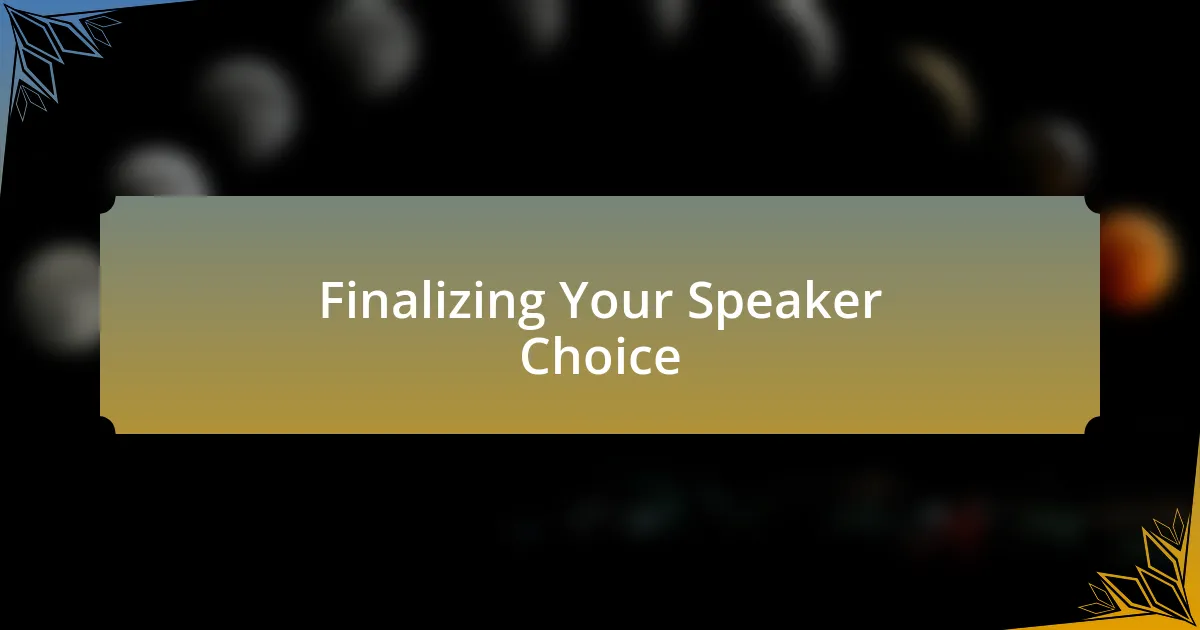
Finalizing Your Speaker Choice
When I finally narrow down my options for a keynote speaker, I always revisit my initial criteria for selection. Not long ago, I faced a tough decision between two fantastic candidates, each offering unique perspectives on customer experience. I took a step back, asking myself which speaker would resonate more with our audience’s specific needs and aspirations. This reflection helped me realize that aligning the speaker’s message with the audience’s expectations was crucial for a successful event.
Another pivotal moment in my process comes from reaching out to previous clients or attendees about their preferences. I remember surveying participants after an earlier conference and discovering that their favorite speaker was one who intertwined humor with expertise seamlessly. It drove home the point that choosing a speaker isn’t just about credentials; it’s about creating an engaging atmosphere. Have you ever thought about how audience feedback can shape your final choice?
Ultimately, I consider logistics in the final decision-making stage. A few years back, I booked a highly sought-after speaker without verifying their availability early on. The disappointment was immense when they had to cancel. I learned the hard way that even the most compelling speaker can’t be effective if they can’t make it to the stage. Balancing the excitement of an inspiring speaker with practical arrangements is essential to ensure the event runs smoothly.